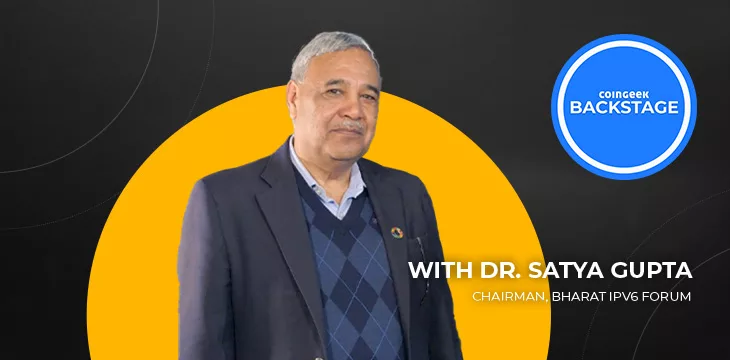|
Getting your Trinity Audio player ready...
|
“IPv6 is the next generation internet, and India is the pioneer,” Dr. Satya Gupta says. In an interview with CoinGeek Backstage, he talked about how IPv6 integrates with 5G and AI to usher in a new era of the internet and why this can only be powered by a universal blockchain network with unbounded scaling.
India’s success with IPv6 stems from necessity. The second-most populated country with over 1.4 billion people, India’s need for IP addresses outweighs most of its peers. As such, the government has ordered all service operators to switch to IPv6 by a set date.
“India has the highest number of IPv6 users. In fact, more than half of all IPv6 users in the world are in India,” Gupta told CoinGeek’s Becky Liggero on the sidelines of the London Blockchain Conference.
While IPv6 is critical for the future of the internet, Gupta noted that it must integrate with other emerging technologies to be of real value. They include 5G and artificial intelligence (AI), with the latter grabbing all the headlines in recent years. Blockchain is the only network that can power this new internet, he added.
In his panel at the conference, Gupta talked about how blockchain can bring trust and security to the IPv6 and IoT world.
“Blockchain enables trust-as-a-service. The main thing IoT lacks is trust and security, and blockchain provides both…If you then combine all four technologies, you can provide everything as a service,” stated Gupta, who’s the chairman of the Blockchain for Productivity Forum.
To illustrate the power of this new era of the internet, Gupta revealed that he created the concept of DeWi, or decentralized Wi-Fi. India has over 20 million Wi-Fi hotspots, and more spring up daily. He believes that blockchain can combine them all, allowing interoperability between all operators and easy roaming for consumers.
Payment companies can tap into this network and offer seamless payments, pushing financial inclusion in a country home to 130 million unbanked adults.
DeWi is just the start, Gupta says. With these four technologies, humanity can solve some of its most pressing needs and make a leap toward better living standards for all.
One world, one blockchain
Only blockchain technology can underpin this bold new world. However, there are over 10,000 networks today, and blockchain tribalism, as well as financial interests, have led to every group believing that theirs is the best network.
For the new internet to work, we need one universal blockchain, Gupta told CoinGeek Backstage.
The communications industry veteran drew parallels between blockchain and the internet. In the latter’s early days, there were several competing protocols, with every other major tech giant building its own. However, the internet only got off the ground after the world settled on TCP/IP as the one protocol to rule them all.
We must zero in on one network for the world, Gupta says. This is the only way to scale blockchain adoption.
Unification is a common theme this year, with this year’s G20 theme being “One earth, one family, one future.”
“I’ve added one blockchain to the slogan,” Gupta said.
For any one blockchain to become a global network, it needs to have a stable protocol that inspires confidence, must scale unbounded to support billions of users, and must keep its fees so low that everyone can afford to use it. Only the original Bitcoin protocol, restored by Satoshi Nakamoto as BSV meets all the criteria.
The BSV blockchain has already won this race, and all that’s left is spreading the message to everyone that a win for BSV blockchain is a win for humanity, Gupta concluded.
Watch BSV Stories – Episode 8: Blockchain ticks all the boxes for India’s thriving e-commerce market

 02-15-2026
02-15-2026 




